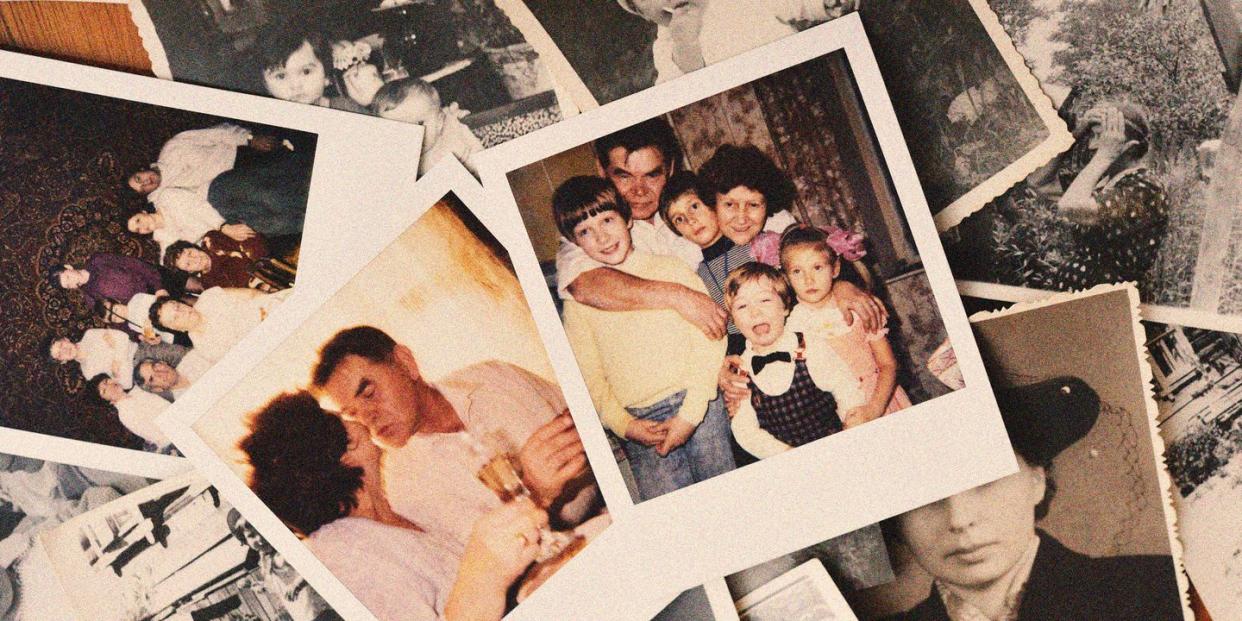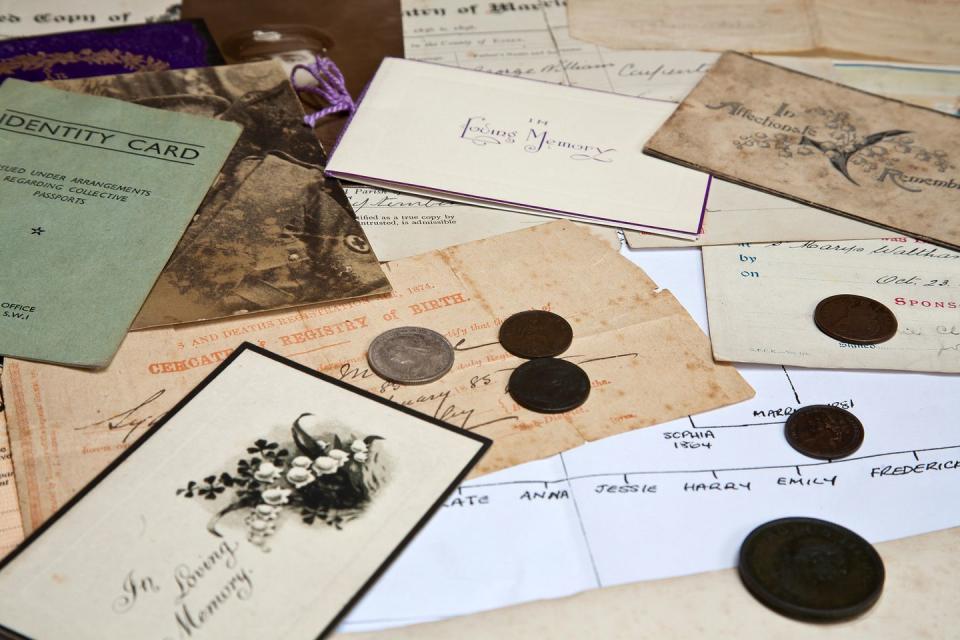"I built a family tree – and found the answer to a lifelong question"

For my entire life, I've always known that a certain family member of mine (okay fine, my grandad) had a... shady past. And like all older folk from the east end of London, stories of him rubbing shoulders with the Krays and getting into fights at Chinese restaurants that ended up with him having the last rites read were common (alright, maybe not all older folk from the east end). I also discovered at his funeral that he'd spent quite a long time in jail – but nobody could (or would) ever confirm why. My dad and uncle had theories, sure, but they'd never been privy to the full facts and I knew it wasn't a subject to push with my grandma.
Over a decade on though, after her passing and because I'm a nosey journalist, I continued to wonder about my family history. After all, whether we like it or not, I believe who and where we come from has to have at least some impact on how we've turned out. It's not everything, of course, nature vs nurture and all that... but it's certainly fascinating to think about.
The mysteries of my family's past has always been intriguing and so I set about trying to track down as much information as I could to build a better picture, not just when it came to my dad's side of the tree but my mum's too, and I quickly learnt that it's actually pretty easy to build your family tree – and to find out the truth behind questions that have long gone unanswered.
How do you build a family tree?
Having seen adverts for Ancestry, the UK's largest family history site, I decided to start there and created an account (memberships start from £10.99 and if you want access to a decent amount of records, it's worth paying – otherwise the process can be painfully slow and stilted, and you'll likely need to recruit the help of your local library and various other record offices).
When you sign up for Ancestry, you'll begin by entering your own details (name, date of birth etc) and are encouraged to add as much information about your parents, and grandparents, as possible. It's helpful if you know things like their birthdays, death dates and marriage dates, but if you're lacking in intel, don't despair.
"Once you start building your tree, you will receive hints alerting you to records in our database that might be relevant to your family," explains Laura House, a genealogist at Ancestry (within its ProGenealogists arm, which helps people track down everything from information to long lost relatives). "These records can tell you where your ancestors lived, their jobs, their socioeconomic circumstances, and so much more. Before long, you will be discovering new ancestors and adding more generations to your tree."
As someone who has used the site, once I'd added in my parents and grandparents to my tree, I can confirm Ancestry provided me with lots of records to review – ranging from census records, to birth registrations – and many were spot on. You do need to be patient though, and to cross reference and check them over, especially if it's a record linked to someone with a common name (shout out to the 417 people on my tree named 'Margaret Anderson').

But... what if you don't have any family history to begin with?
"If you don’t know anything about your family, interview your oldest relatives and ask them for birth, marriage, and death information for their parents, grandparents, and anyone else they can remember," House encourages, saying it's always best to ask open-ended questions. Think: instead of asking 'Was your dad born in Lancashire?', try asking 'Where was your dad born?'
For those who know little to nothing about their biological family (for example, if you are adopted), House suggests taking an AncestryDNA test "which will connect you with genetic relatives and enable you to identify your biological ancestors".
A friend of mine, whose mum is adopted, did this recently and uncovered ten new aunts and uncles she'd previously had no idea about (and also learnt that her great-grandfather was named Harry Potter LOL)! She plans to meet up with one soon (an aunt, not a wizard).
How far back can you trace your family tree?
House reveals that birth, marriage, and death certificates date back to 1837 in England and Wales, 1855 in Scotland, and 1864 in Ireland, so most of us in Britain can easily trace our history back to the Victorian era. Exciting!
"Before the introduction of civil certificates, [you can look at] other records, such as workhouse records, apprenticeship indentures, and baptism registers," she adds. "The coverage of these records varies by region, but some parishes have baptisms, marriages, and burials dating back to 1538. So, with some luck and a little determination, you may be able to trace your ancestors back to the sixteenth century. If you have any noble or royal ancestors, you should be able to go even further."
It's not necessary to use a website like Ancestry to help with this (some library branches, for instance, might have resources that can help you on your quest), but it definitely makes the process a lot easier.
What does a genealogist do?
If you're keen to deep-dive even further, or really need help in finding answers, then it could be worthwhile considering the services of a genealogist. "I work for AncestryProGenealogists, which is the research arm of Ancestry and comprises a large number of professional genealogists from all over the world," House says. "Professional genealogists tend to specialise in specific geographical areas, time periods, or technical niches. For example, I am a specialist in British Isles research and DNA, so the vast majority of my clients are people from the British Isles who want to identify an unknown parent but don’t know where to start."
She adds that many of her clients have managed to make good headway themselves, but have hit a stumbling block along the way. "We know whether or not it's possible to solve their mystery, and exactly where to look to find the information they need."
How much does a genealogist cost?
House says that if you're going via Ancestry's genealogist team, prices are £137 (or $175) per hour, and that clients must book a minimum session length of 20 hours. This totals £2,754 – so it's not the cheapest option, but if you're seriously eager for answers it could be worth considering.
In her work, House has helped people to reunite with their biological parents and is skilled at bringing family stories to life, using all the tools in her arsenal to create vivid pictures of characters from the past using old newspaper clippings and sometimes, even sourcing photos.
"I worked on a BBC3 documentary called Stranger in my Family in which the protagonist, Luke, took a DNA test and discovered he was mixed race," she recalls. "He then went on a journey to find his biological father and learn more about his newfound cultural heritage. I don't want to spoil the ending, but it was an incredibly moving project to work on, and such a fantastic example of the power of DNA and genealogy to transform lives and answer decades-old questions."
Tips for building a family tree
A big one from me is to not limit yourself to official government documentation in your search, check out military records and the newspaper archive, Newspapers.com (access to which is included in some Ancestry membership tiers). It was through this that I finally answered the family mystery of my grandad's 'unique' career and why he served jail time... plenty of clippings came up confirming that he was caught with explosives in his car, possibly on the way to rob a bank (which checked out with some of the whisperings I'd already heard). By digging up old articles, House also discovered that my grandad was then later caught out again in the middle of trying to breaking into someone's office (and apparently he responded to the question "What are you doing?" with "Getting caught", as per to one write-up). S-c-r-e-a-m.
"Newspapers.com is a fantastic resource for uncovering stories about your ancestors and overcoming research challenges," House agrees. "If you want to search for a specific name or phrase, use closed quotes – "like this". If your ancestor used spelling variations for their name, use wildcards like '*' and '?' when you search.
"For example, if you search for "*liz* Sm?th" you will get results for Elizabeth Smith, Elizabeth Smyth, Lizzie Smith, Eliza Smyth and others." Again, you'll need patience to go through all the results, but once you get into the flow of it it's pretty fun and meditative.
If your ancestor had a common name, it can also help to restrict your search to a specific county or particular newspaper, House advises. "You can find birth, marriage, and death announcements, obituaries, court cases, human interest stories, and so much more."
So there you have it: your 101 guide on how to make a start on building your family tree and answering the questions that have bugged you for years about your relatives! Genius. Here's hoping yours aren't (or are, if that's what you're after) as scandalous as some of mine...
An Ancestry membership starts at £10.99 a month, learn more here. It also offers DNA tests from £79.99 (plus shipping), see here for details.
You Might Also Like

